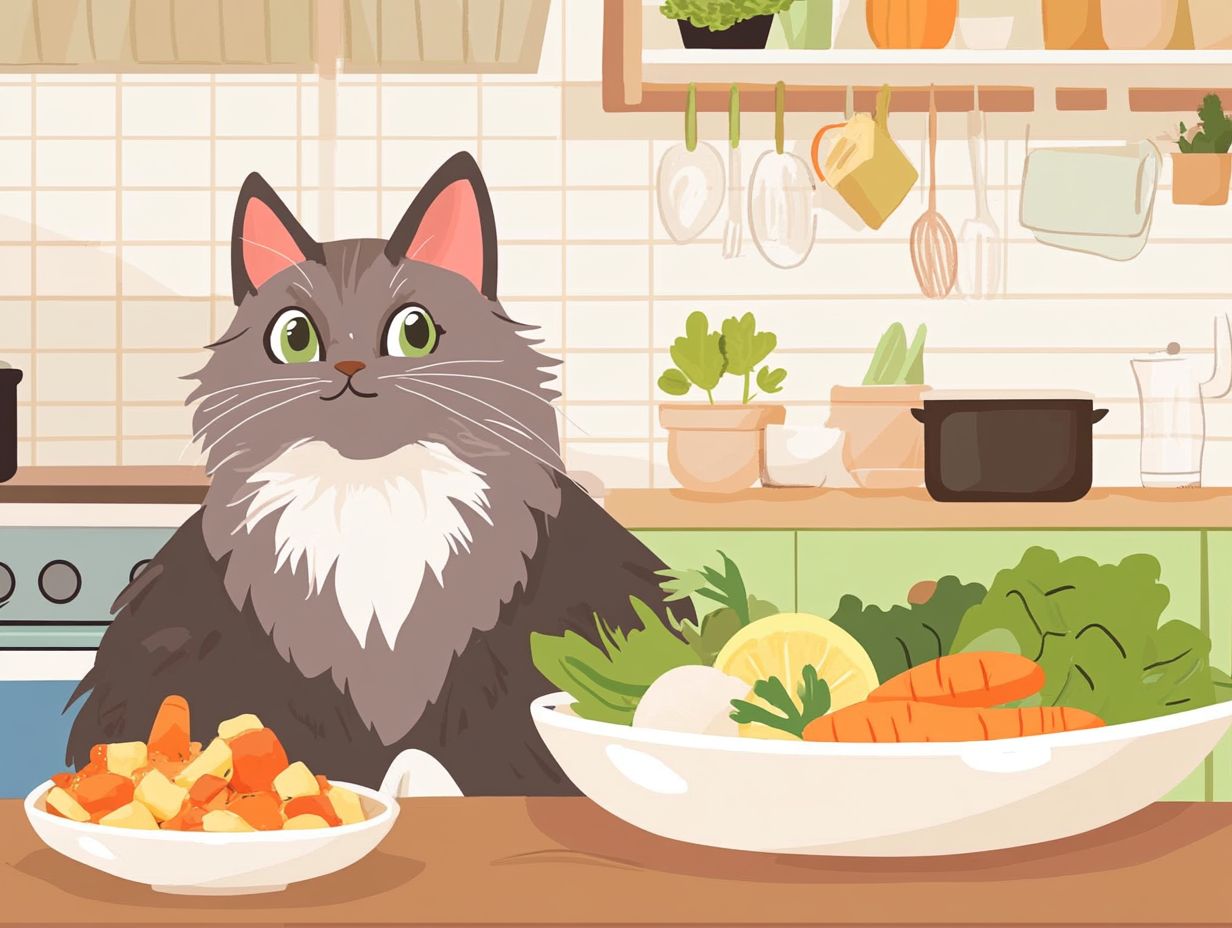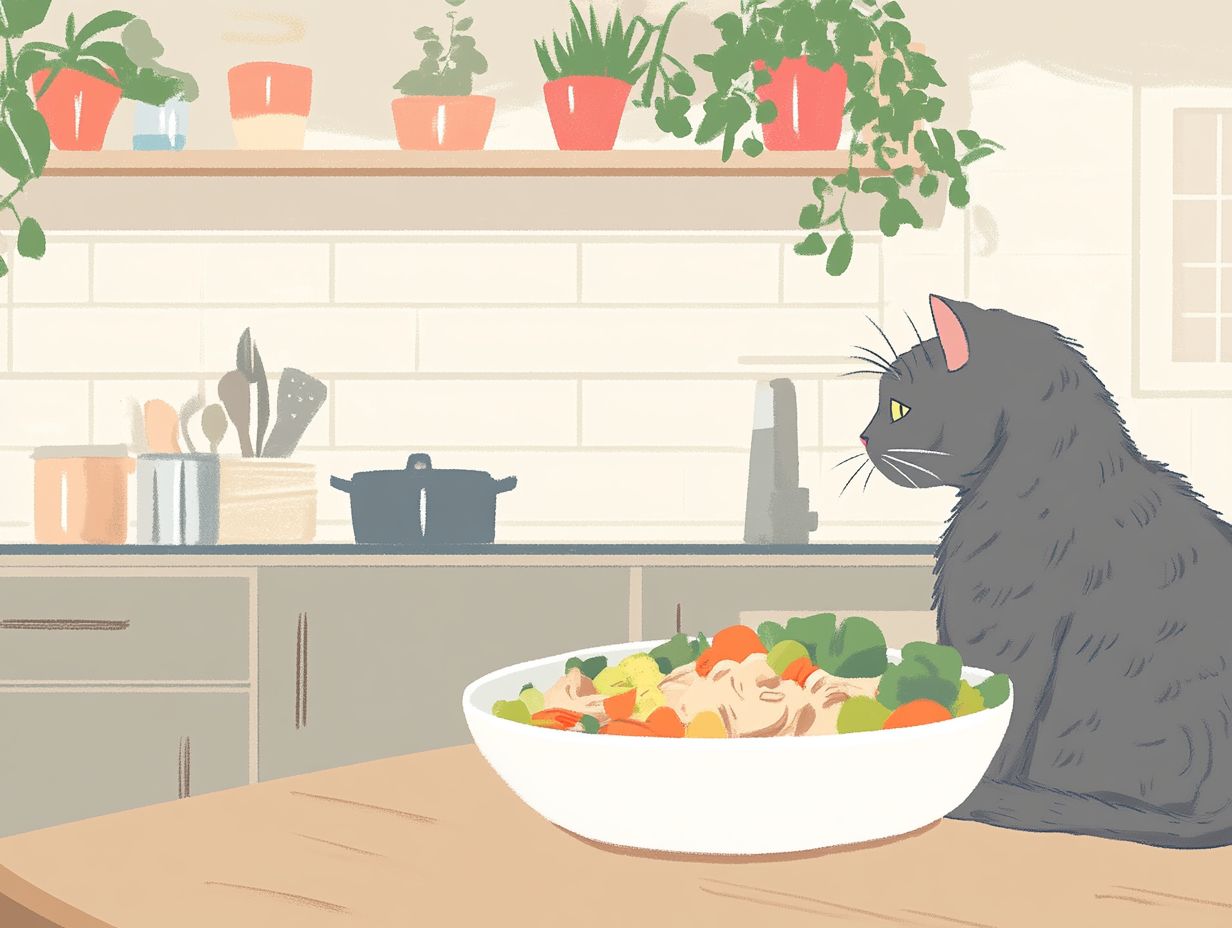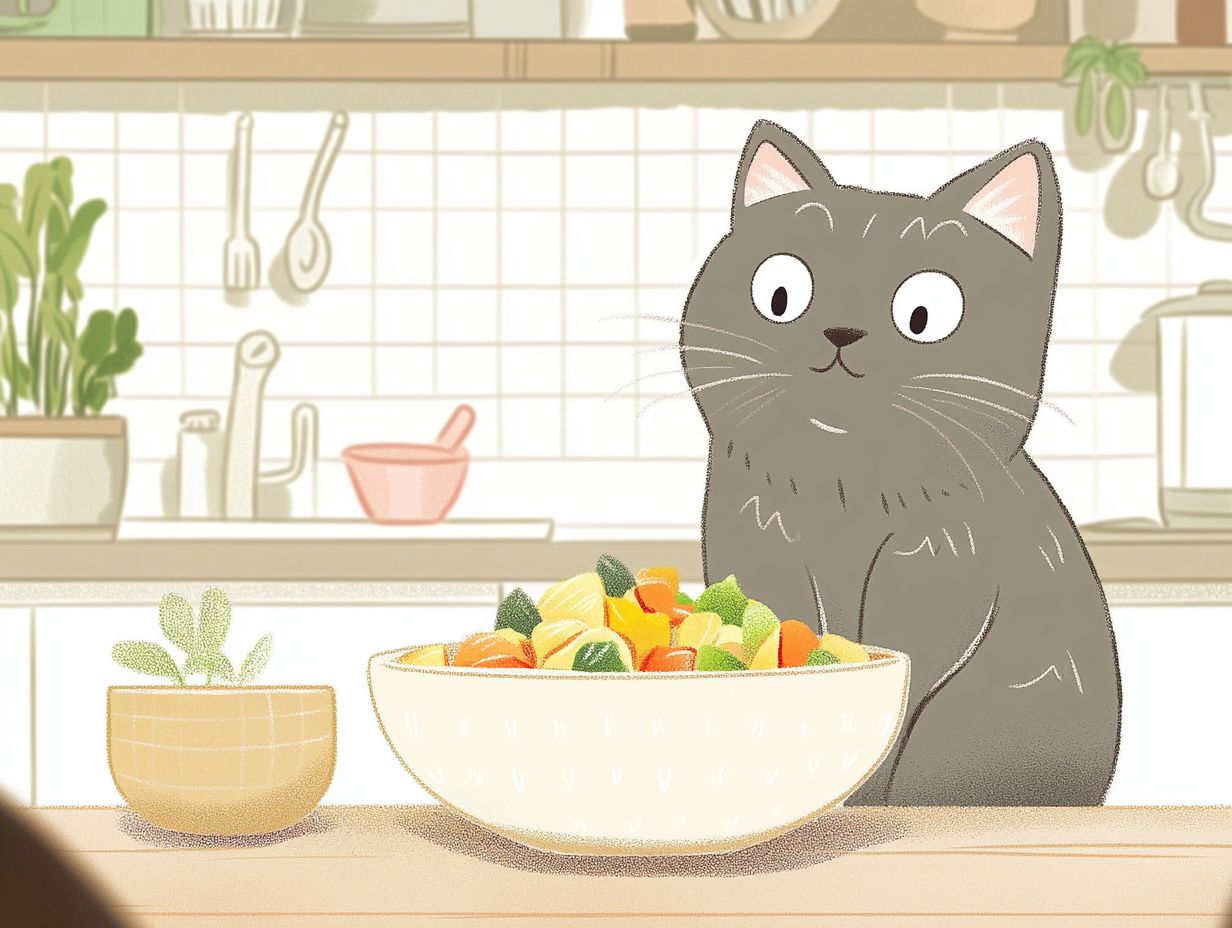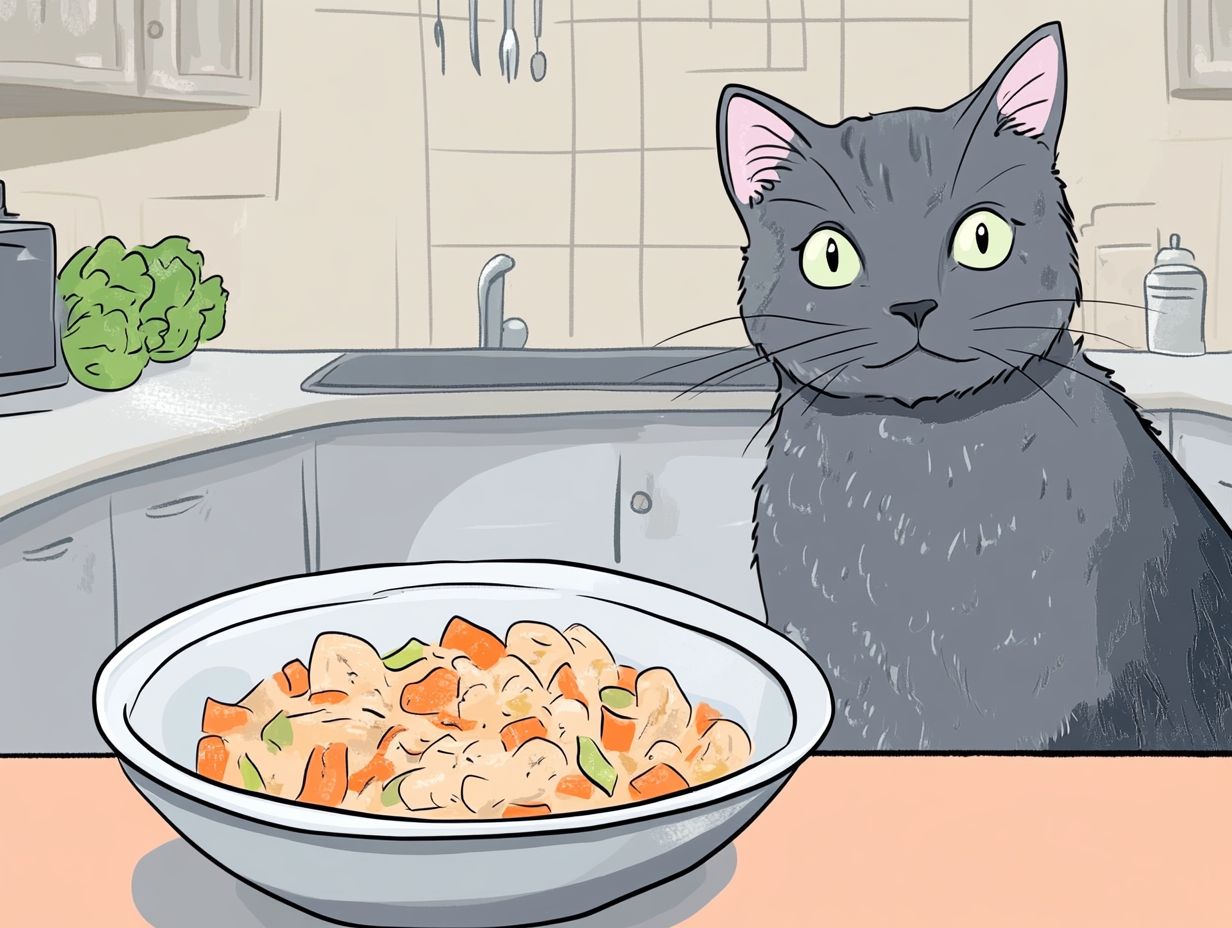As our beloved feline companions age, their needs change significantly, requiring adjustments in their senior cat food and care routines to maintain a healthy life.
Senior cat care is crucial for ensuring their health and comfort, as they may face challenges like decreased mobility, dental issues, and weight management.
This piece explores these changes, the benefits of homemade cat food tailored specifically for senior cats, and practical cooking tips and cat food recipes for better care.
Discover how to enhance your aging cat’s quality of life with thoughtful nutrition and attentive care.
Disclaimer: Always consult with a veterinarian before making significant dietary changes, particularly for senior cats with existing health conditions.
Key Takeaways:

Why is Senior Cat Care Important?
Caring for senior cats is crucial for maintaining their health and quality of life as they age. Older cats encounter challenges related to their changing nutritional needs, decreased mobility, and increased susceptibility to various health issues.
By providing proper care and addressing their specific requirements, we can enhance the well-being of senior cats, enabling them to enjoy their golden years with vitality and good health.
Consulting with a veterinary nutritionist can help develop a tailored approach to senior cat care, ensuring a balanced diet and meeting specific calorie requirements, in line with guidelines from AAFCO and WSAVA.
What Changes Occur in Senior Cats?
Senior cats experience several notable changes, including decreased mobility, which makes it more difficult for them to move around and engage in regular activities.
They may also face dental issues that impact their ability to eat and enjoy food. Additionally, obesity and malnutrition can lead to serious health complications.
Digestive problems may arise, necessitating a re-evaluation of their diet and feeding schedule.
1. Decreased Mobility
Reduced mobility is a common issue among senior cats, significantly impacting their quality of life and ability to engage in normal activities. This decline is often attributed to various health problems, including arthritis, which causes pain and stiffness in a cat’s joints, making movement uncomfortable.
Additionally, weight gain, dental issues, and other age-related conditions can contribute to a cat’s reluctance to exercise. It is essential for cat owners to recognize these changes and promote gentle exercise routines that help their pets maintain strength and flexibility.
Interactive play and climbing structures provide the physical and mental stimulation that all pets need, and senior pets, in particular, benefit greatly from these activities, enabling them to lead healthier and happier lives.
2. Dental Issues
Dental issues are common in senior cats and can lead to discomfort and various health complications if not addressed promptly. These problems are often associated with periodontal disease, which can be extremely painful and may result in infections that hinder a cat’s ability to eat.
A cat experiencing dental pain may go for extended periods without eating, as illustrated in the accompanying photograph. Regular visits to the veterinarian are essential for detecting these issues early, as they offer opportunities for thorough examinations and cleanings that can significantly enhance the overall health of senior cats.
Maintaining dental health is crucial for overall well-being and can help senior cats enjoy longer, higher-quality lives. Preventive measures, such as dental treats and regular dental check-ups, are important, and owners should watch for signs of dental disease, including bad breath, difficulty eating, and swollen gums.
3. Weight Management
Weight management is crucial for older cats, as obesity can lead to a variety of health issues, while underweight cats may suffer from malnourishment. Maintaining an optimal weight helps ensure that they remain active and comfortable, while also reducing the risk of chronic conditions such as diabetes, arthritis, and heart disease.
Pet owners can assist in this process by regularly weighing their pets and adjusting their feeding habits accordingly. Practical feeding advice includes portion control and the benefits of feeding multiple small meals throughout the day to help with digestion and metabolism. Consulting a veterinarian is essential to determine the appropriate caloric intake based on the cat’s age, activity levels, and any existing health concerns.
Additionally, proper food storage and handling practices are crucial for homemade diets to ensure safety and prevent spoilage.
To promote a healthy weight, it is important to incorporate high-quality cat food that meets AAFCO standards for senior cats, which is rich in animal-source proteins, vitamins, and essential fatty acids, and to provide consistent portion sizes. This approach ensures that their nutritional needs are met without the risk of overfeeding.
4. Digestive Problems
Digestive problems are common in senior cats and can hinder their ability to absorb essential nutrients necessary for their overall well-being. As these cats age, they may experience issues such as constipation or sensitivity to certain foods, which can cause discomfort and diminish their quality of life. Veterinary guidelines suggest that owners monitor these symptoms closely.
These digestive issues can lead to poor nutrition, resulting in associated problems such as a weakened immune system, obesity, and lethargy. Signs that should raise concern among cat owners include increased thirst and urination, bloating, and decreased appetite, all of which require immediate attention. While probiotics and omega-3 and omega-6 fatty acids can be beneficial, their necessity should be assessed on an individual basis in consultation with a veterinarian.
A diet rich in nutrients, including high-fiber foods, can help alleviate constipation, and experimenting with different food types can aid in identifying sensitivities. However, homemade diets must meet complete and balanced nutrition standards per AAFCO guidelines, and pet owners should consult with veterinary nutritionists before transitioning to homemade diets.
In summary, a well-balanced diet tailored to support digestive health can help ensure that these cherished companions enjoy their senior years without the added burden of digestive issues, but caution is advised as improper formulations can lead to nutritional deficiencies, notably a lack of taurine-rich foods.
What Are the Benefits of Homemade Food for Senior Cats?

Homemade food for senior cats offers numerous advantages, including enhanced nutritional value, greater control over ingredients, and the ability to accommodate specific dietary restrictions and maintain nutritional balance that often arises with age. However, it’s crucial to ensure that homemade diets are properly formulated to avoid potential deficiencies.
By using vet-approved recipes, pet owners can ensure their cats receive the essential nutrients needed for their overall health as they enter their senior years.
1. Better Nutritional Value
Homemade cat food can offer greater nutritional value than many commercial premium cat food products. This is mainly because it allows for a balanced diet tailored to the specific needs of senior cats. It’s important to remember that commercial diets vary widely, and not all premium brands provide adequate nutrition; look for products that meet AAFCO standards.
Cat owners can select high-quality ingredients, including lean meats, fresh vegetables, and essential supplements, ensuring their pets receive all the necessary nutrients. Preparing meals at home provides flexibility in meeting a cat’s dietary requirements.
Experimenting with different recipes, including tuna patties and mackerel recipes, can help identify particular tastes and textures that a cat enjoys, enhancing mealtime satisfaction and addressing specific health concerns such as allergies or digestive issues.
Overall, this demonstrates that homemade meals can significantly contribute to a beloved cat’s nutritional health and overall vitality, but careful attention to formulation is necessary to prevent deficiencies.
2. Control Over Ingredients
One of the primary benefits of homemade cat food for senior cats is the control it offers over ingredients. This allows pet owners to select healthy, human-grade options tailored to their senior cat’s health and dietary needs while avoiding harmful ingredients such as artificial preservatives, fillers, and common allergens.
Such control is especially crucial for managing health issues common in senior cats, including kidney disease, obesity, and food allergies. By incorporating nutrient-dense ingredients like lean proteins, wholesome grains, and easily digestible vegetables, owners can create meals that specifically support their pet’s health conditions.
This personal approach ensures that a senior cat’s diet is not only flavorful but also utilizes human-grade ingredients while being free from artificial additives and fillers that could exacerbate existing issues, ultimately promoting their overall health and longevity.
3. Tailored to Individual Needs
Custom homemade cat food for senior cats can be tailored to meet their specific nutritional needs and health concerns. This customization can involve adding ingredients that promote joint health, such as omega-3 fatty acids from fish oil, as well as incorporating higher-fiber foods to aid digestion.
For weight management, pet owners may opt for lean protein sources and low-carbohydrate options. It is also important to monitor micronutrients, and supplements may be necessary for senior cats with special dietary restrictions. Additionally, the flavor of the food should be considered, as some cats may prefer certain proteins or textures over others.
Furthermore, it is vital to monitor caloric intake and proper portion sizes to prevent obesity in senior cats, especially when transitioning to homemade diets.
Lastly, safe food storage practices for homemade diets should not be overlooked. Proper refrigeration and adherence to expiration dates are key to preventing spoilage and foodborne illnesses.
Remember to introduce any new diet gradually, whether it be commercial or homemade, to minimize gastrointestinal upset in senior cats.
4. Cost-effective
Preparing homemade cat food can be a cost-effective alternative to premium cat food, particularly when considering the expenses associated with dietary supplements for older cats—which, while beneficial, should only be used under veterinary guidance to avoid potential toxicity or imbalances. This feeding approach gives pet owners complete control over the ingredients, allowing them to tailor the meals to meet their cat’s specific nutritional needs.
By incorporating essential vitamins and minerals—such as omega-3 fatty acids, primarily found in fish oil from sources like mackerel and sardines, which are important for overall health, including coat condition, and taurine for cardiac function—owners can promote their cat’s long-term health. Homemade diets can support health but do not replace the need for regular veterinary care. Over time, the savings from fewer vet bills will likely surpass the initial costs of cooking supplies and high-quality ingredients, making homemade meals both a budget-friendly and nutritious option.
Additionally, establishing a consistent feeding schedule in consultation with your veterinarian to ensure it aligns with your cat’s health needs and incorporating vet-approved recipes with freshly cooked food may help regulate the cat’s digestion.
How to Prepare Homemade Food for Senior Cats?
The process of preparing homemade food for senior cats involves several key steps.
- First, it’s essential to consult a veterinary nutritionist with experience in feline diets to ensure the meals meet your cat’s specific nutritional needs.
- Next, use a variety of nutritious ingredients to create balanced meals using nutritious food.
- Additionally, following proper cooking instructions and food safety guidelines, such as understanding foodborne pathogens, is crucial to ensure that the meals you prepare are both safe and healthy for your senior cat.
1. Consult with a Veterinarian
Consulting with a veterinarian or a veterinary nutritionist with experience in feline diets is a crucial first step in preparing homemade food for senior cats, as it ensures that their specific health concerns are taken into account. These professionals play a vital role in evaluating the individual health status of each feline, often considering chronic conditions such as kidney disease, diabetes, or obesity.
Given the complex dietary needs of senior cats, a well-balanced nutritional diet can significantly enhance their quality of life and longevity. Professional guidance can help owners determine the appropriate proportions of proteins, fats, carbohydrates, and protein sources, as well as ensure the inclusion of all necessary vitamins and minerals.
This level of expertise minimizes the risks associated with improper feeding and enables owners to provide nourishing meals tailored to the specific needs of their senior cats. For some great options, check out these homemade food recipes for aging felines.
2. Gather Necessary Ingredients

The significance of variety and quality in preparing homemade food for senior cats lies in ensuring a balanced diet that meets their specific nutritional needs. Homemade diets for senior cats should incorporate a diverse range of ingredients, including chicken, turkey, rabbit, and tuna, to achieve this balance. Key components should include:
- High-quality proteins: Sources like chicken, turkey, and fish help maintain muscle mass in geriatric cats.
- Healthy carbohydrates: Options such as rice, oats, and sweet potatoes provide easily digestible energy.
- A variety of vegetables: Including carrots, peas, spinach, and cooked vegetables offers essential vitamins, minerals, and fiber for healthy digestion. Note that certain vegetables like onions and garlic should be avoided as they are toxic to cats.
- Healthy fats: Ingredients like fish oil and flaxseed oil are vital for energy, skin health, and maintaining a healthy weight.
By incorporating a wide range of foods, pet owners can ensure that all necessary nutrients are available. Equally important is the quality of these ingredients; fresh, high-quality, and organic options should be used whenever possible, utilizing human-grade ingredients. Additionally, any changes in diet should be introduced gradually to avoid gastrointestinal upset in cats. It’s also important to monitor a cat’s weight and body condition score when switching to homemade diets, as obesity can be a risk if caloric intake is not adjusted correctly. Furthermore, without proper formulation, there is a potential for nutritional deficiencies in homemade diets, so consulting veterinary professionals for balanced recipes is essential. Homemade food may not be appropriate for all cats, particularly those with specific health conditions.
The nutritional value of homemade food is significantly influenced by ingredient quality, as lower-quality components may contain harmful substances like artificial additives or excessive fillers, which can adversely affect flavor preferences. In contrast, animal-source proteins typically offer a better nutritional profile. Additionally, the flavor and texture of the food are affected by ingredient quality—fresh meat is generally more palatable than processed alternatives, and food made with whole grains has a different texture compared to that made with processed flour. Consider whole grains for enhanced fiber content.
3. Follow a Balanced Recipe
Senior cats require a balanced diet just like their younger feline companions. It is essential to follow a well-structured recipe that includes essential animal-source proteins, taurine, and appropriate fat levels when preparing homemade food for senior cats to ensure they receive the necessary nutrients aligned with their nutritional balance.
Most senior cats have unique dietary needs that differ from those of younger cats. By adhering to veterinarian-approved recipes, owners can provide their senior cats with the appropriate ratios of proteins, carbohydrates, and essential fats that support their overall health and well-being, following feeding guidelines.
These recipes can help bolster their immune systems, maintain energy levels, and assist with weight management. Not all ingredients are suitable for senior cats, and relying on well-meaning but misguided general misconceptions can lead to dangerous nutritional deficiencies.
4. Store and Serve Properly
Storing and serving homemade food for senior cats is essential for ensuring food safety and quality. This practice enables senior cats to enjoy the nutritional benefits of homemade meals while minimizing the risk of spoilage and contamination from common toxins like garlic and onions.
The best storage options are airtight containers made of BPA-free plastic or glass, as they help maintain freshness and prevent contamination. Storing meals in smaller portions can facilitate quicker consumption and reduce waste.
Each container should be clearly labeled with the date of preparation, allowing owners to track how long the food has been stored and ensuring it is used before its safety window—which encompasses risks related to microbial growth—expires. Refrigerated homemade cat food should be consumed within three to five days, while any leftovers can be frozen for up to two months.
Proper storage helps preserve the food’s nutritional value and flavor.
What Other Tips Can Help with Senior Cat Care?
Along with tailored nutrition, several key tips can enhance senior cat care and contribute to the overall health and happiness of older felines.
- Regular veterinary care: Routine check-ups help monitor your cat’s health and proactively address any issues that may arise. It is crucial to consult a veterinarian before making any significant dietary changes, especially regarding unique health considerations for senior cats.
- Exercise and playtime: While older cats may be less active, it remains important to encourage light exercise and mental stimulation through play.
- Mobility assistance: Depending on their condition, senior cats may require help with mobility. Making household adjustments can also facilitate their navigation within the environment.
- Proper hydration: Senior cats are particularly prone to dehydration, so ensuring they have access to fresh water is essential. Incorporating wet food can also provide an additional source of hydration for senior cats.
- Dental care: Older cats face an increased risk of dental diseases and other oral health issues. It is crucial to monitor their dental condition and take necessary steps to address their needs.
1. Regular Veterinary Check-ups
Regular veterinary check-ups are essential for the care of senior cats, as they enable ongoing health monitoring and facilitate the early detection of potential issues. These routine visits play a crucial role in ensuring the well-being of older felines, who often face unique health challenges that may go unnoticed.
During these examinations, veterinarians can assess various factors, including weight, dental health, and kidney function. By closely monitoring changes in health status, pet owners can make informed decisions regarding necessary dietary adjustments or interventions.
Early identification of conditions such as hyperthyroidism or diabetes can significantly impact treatment outcomes, ultimately leading to a better quality of life for senior cats. By prioritizing regular veterinary visits and monitoring weight—adjusting portion sizes based on the individual cat’s health and activity level—caregivers can proactively address concerns, providing peace of mind for both themselves and their beloved pets.
2. Exercise and Playtime
Regular exercise and playtime are essential for maintaining mobility and a healthy life for senior cats. Gentle activities tailored to their specific needs can stimulate their minds while promoting physical health.
Engaging games with interactive toys, feather wands, or laser pointers offer exercise and movement without overstressing them. Short bursts of play can help maintain agility and strengthen their muscles. Additionally, scratching posts and climbing structures provide opportunities for senior cats to enhance their flexibility and balance.
Consistent exercise can help prevent obesity, which is common in older cats, and promote emotional well-being by reducing anxiety and boredom, ultimately making them feel loved and integrated into the family.
3. Proper Hydration
Ensuring proper hydration is crucial for senior cat care, as dehydration can worsen various health issues, particularly kidney disease, and lead to serious complications. This is particularly important because aging felines often experience a reduced thirst drive, making it challenging for them to maintain adequate fluid levels. Consulting a veterinarian for tailored advice on hydration is recommended.
As a devoted pet owner, it is essential to recognize the signs of dehydration, which include dry gums, lethargy, and decreased skin elasticity. To encourage increased water intake, consider offering fresh, filtered water in a clean bowl, providing wet food options, or even introducing flavored water to make drinking more appealing.
Integrating hydration into their daily routine can significantly enhance their overall health and well-being.
4. Dental Care

Dental care is an often-overlooked aspect of senior cat care, yet it is crucial for preventing health issues related to poor oral hygiene. As cats age, their dental health can deteriorate, leading to problems such as plaque buildup, periodontal disease, and pain. This decline can have detrimental effects on their overall health, potentially leading to systemic diseases like heart disease.
To minimize these risks, it is essential to prioritize proper dental care, including routine brushing and dental treats, along with regular veterinary check-ups. These check-ups allow for the early detection of potential issues. Veterinarians can provide professional dental cleanings, assess the cat’s oral health, and adopt a proactive approach to ensure that these beloved companions remain comfortable and happy as they age.
Frequently Asked Questions
What are the benefits of feeding my senior cat homemade food?
Feeding your senior cat homemade food allows you to control the ingredients, using human-grade ingredients, and ensure they are receiving a well-balanced, nutritious diet. It can also be beneficial for cats with allergies, flavor preferences, or sensitivities to certain ingredients. Remember that cats are obligate carnivores and rely heavily on animal-source proteins for optimal health.
What is the feeding schedule for my senior cat’s homemade food?
It is recommended to follow a feeding schedule and feed your senior cat homemade food twice a day, in smaller portions. This allows for better digestion, aligns with their calorie requirements, and prevents overeating.
Can I use any ingredients in the cat food recipes for my senior cat?
No, it is important to research safe and appropriate ingredients, including safe sources of fats and carbohydrates, and ensure you are providing a balanced diet. Some common foods, such as onions and grapes, can be toxic for cats and pose health concerns. Always consult with your veterinarian before making significant dietary changes, especially for senior cats with pre-existing conditions.
Are there any specific nutrients or pet food supplements I should include in homemade food for my aging feline?
Yes, senior cats have different nutritional needs, including specific protein sources and dietary supplements, than younger cats. It is important to include high-quality protein, such as chicken, rabbit, or mackerel, healthy fats like coconut oil, and easily digestible carbohydrates like sweet potato in their homemade food. You may also want to consider adding supplements such as joint support, omega-3 fatty acids, or meal completers like Alnutrin.
How can I introduce homemade recipes to my senior cat’s diet?
It is best to introduce homemade food gradually, mixing it in with their regular food, such as premium cat food, and gradually increasing the amount over a week or two. This allows their digestive system to adjust to the new diet and maintain nutritional balance.
Are there any potential risks, such as foodborne pathogens, or downsides to feeding my senior cat homemade food?
While homemade food can offer many benefits, it is important to consult with a veterinarian or a veterinary nutritionist and do thorough research to ensure you are providing a balanced diet for your senior cat. Improperly balanced homemade diets can lead to nutrient deficiencies, food safety issues, or other health concerns. Additionally, proper food storage practices are crucial to prevent spoilage; always check for signs of bad or expired food to ensure safety in feeding homemade diets.